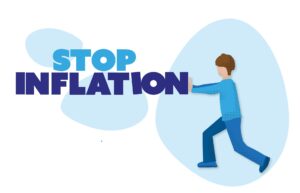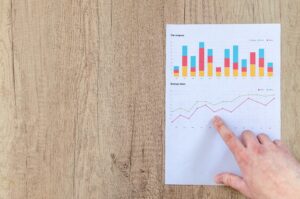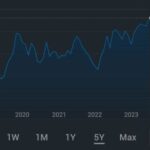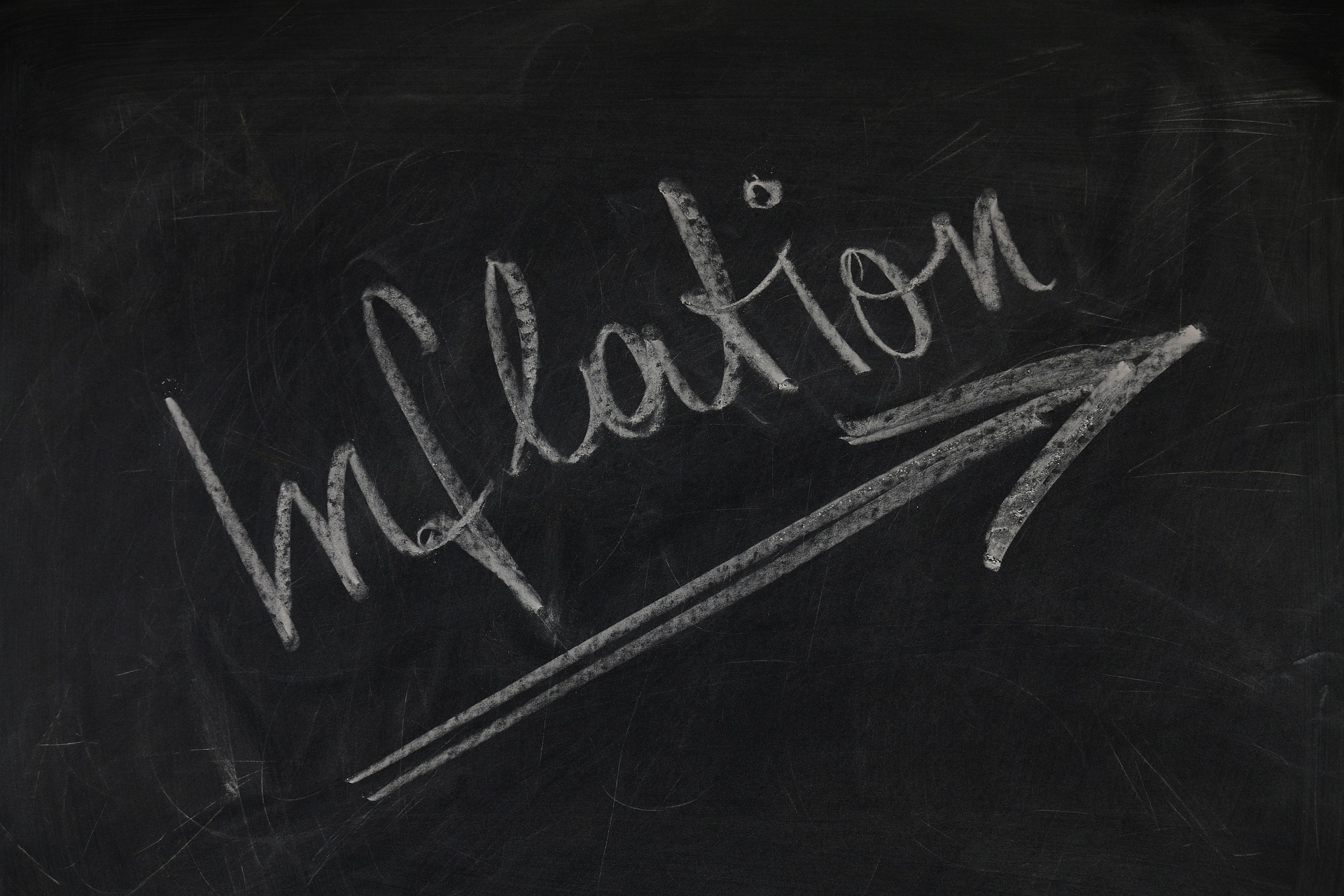Inflation
What is Inflation ? | Definition of Inflation | Inflation in economics | Inflation meaning
Inflation is a measure of the rate at which the general level of prices for goods and services is rising, and subsequently, purchasing power is falling. Central banks attempt to limit inflation, and avoid deflation, in order to keep the economy running smoothly.
When the general level of prices rises, each unit of currency buys fewer goods and services; consequently, inflation reflects a reduction in the purchasing power of money – a loss of real value in the medium of exchange and unit of account within an economy. A chief measure of price inflation is the inflation rate, the annualized percentage change in a general price index (normally the consumer price index or CPI) over time.
Inflation in layman’s terms
Inflation can also be defined as the general decline in purchasing power of a specific currency. For example, if the inflation rate in India was 2% over a period of one year, then a pack of chewing gum that cost ₹ 1.00 at the beginning of the year would cost ₹ 1.02 at the end of the year.
Inflation can be caused by a variety of factors, including an increase in the money supply or an increase in government spending. It can also be caused by an increase in production costs, such as when the cost of raw materials increases.
Central banks attempt to limit inflation, and avoid deflation, in order to keep the economy running smoothly. When inflation is too high, people may begin to expect higher prices in the future, and this can lead to a cycle of higher and higher prices. This can be harmful to an economy because it can lead to uncertainty and instability.
Conclusion : Inflation is an important concept in economics and can have a significant impact on an economy. It is important for individuals and businesses to understand the causes and effects of inflation, and how it can affect their financial decisions.

Inflation causes | Causes of Inflation
There are many possible causes of inflation, and the specific factors that contribute to inflation can vary depending on the economy and the time period. Some possible causes of inflation include:
- An increase in the money supply: When the amount of money in circulation increases, the value of each unit of currency decreases, leading to higher prices.
- An increase in government spending: If the government increases spending without a corresponding increase in tax revenue, this can lead to higher prices.
- An increase in production costs: If the cost of raw materials or other production inputs increases, this can lead to higher prices for goods and services.
- Changes in interest rates: Interest rates can affect inflation in a number of ways. For example, if interest rates are low, people may be more willing to borrow money, which can lead to increased spending and higher prices.
- Changes in exchange rates: If a country’s currency appreciates or depreciates against other currencies, this can affect the prices of imported and exported goods, leading to changes in the overall level of prices.
- Changes in taxes: If taxes are increased or decreased, this can affect the prices of goods and services. For example, if the government increases sales taxes, this can lead to higher prices for consumers.
- Changes in the level of economic activity: If the economy is growing rapidly, this can lead to increased demand for goods and services, which can drive up prices.
- Changes in the level of unemployment: If unemployment is high, there may be less demand for goods and services, which can lead to lower prices. On the other hand, if unemployment is low, there may be more demand for goods and services, which can lead to higher prices.
- Expectations of future inflation: If people expect that prices will increase in the future, they may be more willing to spend money now, leading to increased demand and higher prices.
- Monopolies or Oligopolies : When a small number of firms control a large share of the market for a particular good or service, they may be able to set higher prices without losing customers. This can lead to higher prices for consumers and contribute to overall inflation.
Effects of Inflation
- Inflation can erode the purchasing power of money, making it harder for individuals and businesses to afford goods and services.
- It can lead to higher interest rates, as lenders try to compensate for the loss of purchasing power by charging higher rates on loans.
- Inflation can create uncertainty and instability in the economy, making it difficult for businesses to plan for the future and invest in long-term projects.
- It can result in a redistribution of wealth, as those with fixed incomes (such as retirees) may see their purchasing power decline while those with assets that appreciate in value (such as property owners) may see their wealth increase.
- Inflation can cause the cost of living to rise, making it more difficult for individuals and families to make ends meet.
- It can lead to wage stagnation, as workers may not be able to keep up with the rising cost of living and may not be able to negotiate higher salaries to compensate.
- Inflation can make it more difficult for businesses to compete, as they may need to increase prices in order to cover their rising costs, but may not be able to pass these higher costs on to consumers.
- It can lead to higher levels of unemployment, as businesses may not be able to afford to hire new workers or may need to lay off existing workers in order to cut costs.
- Inflation can lead to a decline in the value of a country’s currency, making it less competitive on the global market and potentially leading to a trade deficit.
- It can lead to an increase in the cost of borrowing for governments, businesses, and individuals, making it more difficult for them to access credit and finance important investments.
Inflation example

- Rising prices of groceries due to an increase in demand for certain products.
- Higher rent prices in popular neighborhoods due to an influx of new residents.
- Increased cost of health care services due to advancements in medical technology and increased demand for care.
- Rising gas prices due to a decrease in supply and an increase in global demand.
- Higher college tuition costs due to a rise in operating expenses and a competitive job market for graduates.
Types of inflation | Types of inflation in economics
- Demand-pull inflation: This type of inflation occurs when demand for goods and services exceeds the supply, leading to an increase in prices.
- Cost-push inflation: This type of inflation occurs when the cost of production increases, leading to higher prices for goods and services.
- Hyperinflation: This is a rapid and out-of-control increase in prices, often caused by a lack of confidence in a country’s currency or economy.
- Structural inflation: This type of inflation is caused by long-term factors such as changes in the economy or shifts in the labor market, leading to a persistent increase in prices.
- Supply-side inflation: This type of inflation is caused by a reduction in the supply of goods and services, leading to higher prices.
- Imported inflation: This type of inflation occurs when a country experiences a rise in prices due to an increase in the cost of imported goods.
- Core inflation: This type of inflation excludes volatile items such as food and energy prices, providing a more stable measure of overall price increases.
- Deflation: This is the opposite of inflation, where prices consistently fall over time.
How to prevent inflation

There are several ways to prevent inflation:
- Implementing fiscal policies: Governments can control inflation by implementing fiscal policies such as lowering government spending and increasing taxes to reduce demand and prevent overheating of the economy.
- Monetary policies: Central banks can control inflation by implementing monetary policies such as increasing interest rates to reduce borrowing and spending.
- Maintaining a stable money supply: Central banks can maintain a stable money supply by controlling the amount of money in circulation and preventing the creation of excess money.
- Improving productivity and efficiency: Governments and businesses can increase productivity and efficiency by investing in new technologies and improving the skills of the workforce. This can help keep prices stable and prevent inflation.
- Managing international trade: Governments can manage international trade by implementing policies that ensure a stable balance of trade and prevent sudden shifts in demand and supply.
- Reducing corruption and waste: Governments can reduce corruption and waste by implementing measures to improve transparency and accountability, and by ensuring that public funds are used effectively and efficiently.
Inflation formula
The inflation formula is:
Inflation = ((Current Price – Previous Price) / Previous Price) * 100
For example, if the current price of a good is ₹100 and the previous price was ₹80, the inflation would be:
Inflation = ((100 – 80) / 80) * 100 = 25%
Who benefits from Inflation ?
Inflation can benefit some individuals and groups, such as:
- Debtors: When the cost of living increases due to inflation, the value of their debts decreases, making it easier for them to pay back their loans.
- Savers: Inflation can increase the value of savings accounts, as the interest earned on the account will be higher in real terms.
- Investors: Inflation can lead to an increase in stock prices, which can benefit investors as their investments will be worth more.
- Government: Inflation can benefit the government as it increases tax revenues and reduces the value of government debt.

Who gets most affected by inflation ?
Inflation can also have negative effects on certain individuals and groups, such as retirees and those on fixed incomes, who may struggle to afford the increasing cost of living.
Is inflation good or bad ?
It depends on the context and the level of inflation. In general, moderate levels of inflation can be beneficial for an economy as it can stimulate economic growth, encourage borrowing and spending, and reduce the value of debt. However, high levels of inflation can be harmful as it can lead to uncertainty, erode purchasing power, and hinder economic growth.

ALSO READ : Indian CBDC : Increase your knowledge | More than 20 facts
ALSO READ : How to start learning coding | 5 famous programming languages










